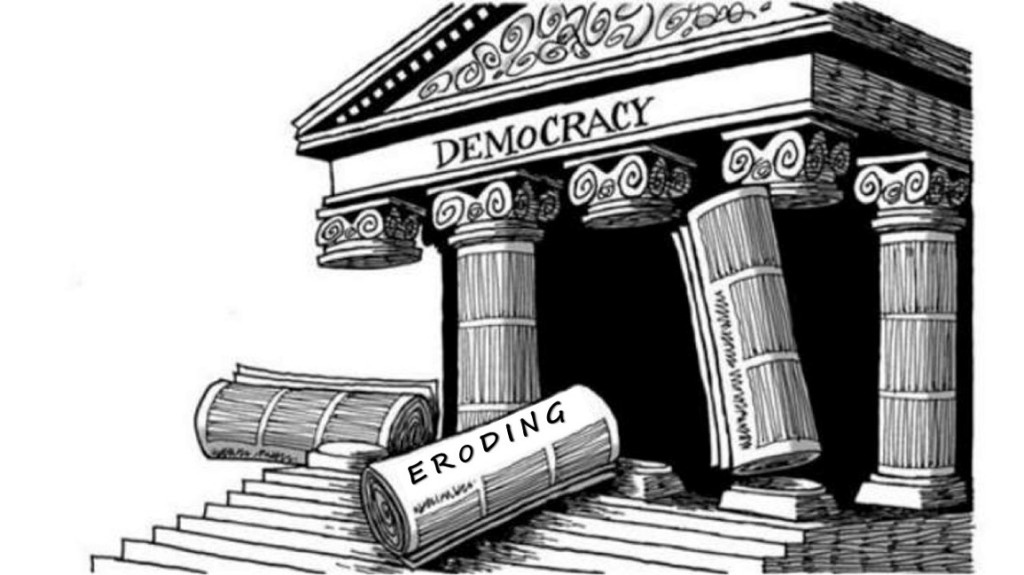PODCAST:
TRANSCRIPT:
We make a very large mistake when we imagine that western-style democracy is destined to remain ascendant forever. Authoritarianism is the proverbial wolf at the door in every democratic society, and its constant tendency is to change forms from time to time and from place to place. It has been correctly said by many that the price of constitutional democracy is eternal vigilance, and the reason this is so is that what Nietzsche called the will to power is in some form or other a constant of human existence. There are many conditions that can contribute to the death of a democratic order. I’m going to outline several of the main ones that seem to me to have special relevance in our time.
To begin with, one factor that can erode a democracy is what the American founders called the problem of factionalism or any form of special-interest politics. Any politics of the demos must serve the demos in its entirety, and if this was not true of the United States at its founding or at any other time, or any other country at any time whatsoever, it remains that any democracy that’s worthy of the name at least aspires to this. Ideals are the kind of thing that we only ever aspire toward; we never achieve them in any once-and-for-all way, and this includes difference-blind impartiality. A democratic order doesn’t play favorites but recognizes that power belongs to all of the people equally—in principle and, insofar as we can manage, in practice. The idea that the state could ever be truly difference-blind has come under heavy criticism in recent decades, but when the aspiration is abandoned entirely and replaced by any kind of factionalism, democracy is in peril.
It’s in trouble as well when an ethos of mistrust and uncivility comes to prevail, the Hobbesian war of all individuals or groups against all other individuals or groups. What Hobbes worried about most in the context of seventeenth-century England was civil war, where he conceived this in individualistic terms. Today we might better worry about this in more collective terms, although both are antithetical to the kind of social atmosphere on which any democracy depends. Hobbes was no democrat, but his warnings about civil war have about as much relevance today as they did in his time. Today it is culture wars that divide us more than the more overt kind of war of which he was speaking. Either one is the undoing of a democratic order.
The third condition that can undermine a democracy, and again from within, is when the will to power trumps all. When heads of state know little apart from how to conduct election campaigns, when cabinet ministers lack expertise regarding their ministry, and when political action is never more than a means of gaining and holding power, we are in trouble.
The fourth condition is when partisan motives animate everything and everyone in a society, especially covertly. When everything is politicized, including whole professions, institutions, and practices that declare themselves nonpartisan while practicing the opposite, trouble ensues and leads quickly into the next condition.
This is an erosion of our common trust in institutions, and not only the ostensibly public ones. A democracy is heavily reliant on its institutions and procedures, from education to the courts, law enforcement, intelligence, military, the press, the professions, corporations, the electoral process, and any number of others, all of which again are not—or are not supposed to be—in the business of partisan politics. When this changes, and when a large enough number of people begin to notice, public trust is lost and once lost is extremely difficult to regain.
The sixth condition is a simple absence of vigilance, which will often occur when a countervailing vigilance takes a society in some other direction. When an ideology that leans heavily to either the right or the left gets too much wind in its sails and begins to lack opposition, trouble ensues. Democracy is sustained by a tension of countervailing forces, none of which achieves dominance and all of which are compelled to negotiate and to compromise. Ideologues do not compromise but engage in forms of “struggle” that can resemble war. The content of their ideology is irrelevant; what matters is the modus operandi and the ethos to which it gives rise.
The seventh and last condition I will mention is economic desperation. A well-functioning democracy can and often has weathered economic downturns of one kind or another, but when the fabric becomes threadbare and the level of desperation becomes acute, any democratic order can succumb to authoritarianism, and our own is no exception.
My slightly pessimistic view of our times is that the first six of these conditions are all, let’s say, causes of serious concern and that should the seventh materialize on a sufficiently large scale, western-style constitutional democracies might soon be replaced by some form of authoritarianism. In no nation is democracy destined to prevail over authoritarianism forever. Nothing is inevitable here except that our democracies will die if the conditions that make them possible erode, and they are eroding—undoubtedly faster in some nations than others. Democracy in America seems to me in full-blown crisis. Both political parties, public institutions, the corporate world, big technology, the press, education, the culture industry—all of it looks to be walking in lockstep down a dangerous road. Canadian democracy seems to me somewhat less badly off, the political culture in this country being decidedly less hot-headed if no smarter than our southern neighbor. Canadian politics is bland, and this may be its saving grace. American politics isn’t bland, and it’s heading toward a cliff. The future is always uncertain, but if authoritarianism ever does replace democratic rule in any of the older constitutional orders, it’s sure to appear in a form that we haven’t seen before, one that continues to speak the language of democracy while turning into its opposite. I am not prophesying any return to fascism. When history repeats itself, it does so in a new form, an eternal repetition not of the same but of the similar, and if authoritarianism does gain ascendancy it’s likely to market itself as a more perfect democracy and to be defended by people who know nothing of democracy’s history and philosophical underpinnings.
 |
 |
#deathofdemocracy #democracy


Leave a comment